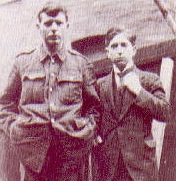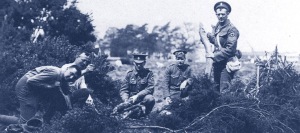Ivor Gurney- Poet and Composer 1890 – 1937 Part Three
by Michael Patrick O'Leary
This article was published in the Mosaic section of Ceylon Today on Sunday June 1 2014.
War
This year marks the centenary of the start of the First World War. The BBC will be marking the centenary with four years of programmes covering the war. Among these programmes will be one presented by Tim Kendall, Professor of English at Exeter University, entitled The Poet who Loved the War: Ivor Gurney, 1914–1918. Gurney does not fit easily into the category of “war poet” and it would be wrong to conclude that Gurney’s war experiences caused his mental problems. His work is not like that of Graves, Owen, Sassoon or Rosenberg. Readers who want a full critical analysis of the poetry should read the blogs of Kendall and Philip Lancaster.
In 1915, Ivor Gurney joined the Fifth Gloucester Reserve Battalion and saw active service on the Western Front between June 1916 and September 1917. On Gurney’s departure for the Somme, Herbert Howells dedicated his Piano Quartet in A minor: ‘To the Hill at Chosen and Ivor Gurney who knows it’. Chosen Hill in Gloucestershire had been a favourite walking place for the two men. I used to walk from my home to the top of Chosen Hill and look at the city spread below me or sit in quiet contemplation in the church at top of the hill. Today one cannot take the same route because motorways, bypasses, and industrial estates dominate the landscape.
Gurney with Herbert Howells
In the trenches, he began writing poetry prolifically. On April 6, 1917, he was shot in the upper arm.
Pain
Pain, pain continual: pain unending:
Hard even to the roughest, but to those
Hungry for beauty…Not the wisest knows,
Nor most pitiful-hearted, what the wending
Of one hour’s way meant. Grey monotony lending
Weight to the grey skies, grey mud where goes
An army of grey bedrenched scarecrows in rows
Careless at last of cruellest Fate-sending.
Seeing the pitiful eyes of men foredone,
Or horses shot, too tired merely to stir,
Dying in shell-holes both, slain by the mud.
Men broken, shrieking even to hear a gun-
Till pain grinds down, or lethargy numbs her,
The amazed heart cries angrily out on God.
Wartime Songs
He managed to write five songs in the trenches and get them published. The songs were about a longing for peace and security and a concern with the nature of death. “By a Bierside” was a setting of a poem by John Masefield; “In Flanders” is a setting of a poem by his friend FW Harvey (Sung by Michael Lampard, baritone on
“Severn Meadows” is a setting of one of Gurney’s own poems:
Only the wanderer
Knows England’s graces,
Or can anew see clear
Familiar faces.
And who loves joy as he
That dwells in shadows?
Do not forget me quite,
O Severn meadows.
Listening to the rendition by Christopher Maltman, baritone and Roger Vignoles, piano will bring tears to the eyes.
“Even such is Time” was a setting of the poem that Sir Walter Raleigh wrote on the night before his execution. The fifth song was a setting of “The Fiddler of Dooney” by WB Yeats.
Life in the Trenches
Gurney seemed, to some extent, to enjoy the camaraderie of the trenches. “The life is as grey as it sounds, but one manages to hang on to life by watching the absolute unquenchability of the cheerier spirits – wonderful people some of them; after all, it is better to be depressed with reason than without. When confronted with a difficult proposition the British soldier emits (rather like the cuttle fish) a black appalling cloud of profanity; then does the job.”
According to Michael Hurd, Gurney was able to write calm letters home because he had found a kind of inner peace through being part of the war. Being an ordinary private meant he was a disposable item whose path was marked out for him without him having to make decisions. “Caught up in a loving comradeship wherein all suffered equally and endured, he felt perhaps for the first time in his life a sense of security – a sense that he was no longer the odd man out, and that he had found the family he had always been looking for.”
He did witness horrors. “The front line trenches of both sides were very close to one another in places, so close in fact that a bomb could easily be thrown from one to the other, and No Man’s Land was littered with the dead bodies of men who had been scythed down by machine-gun fire in the last attack… The cemetery at Richebourg was an eerie spot; it had been completely churned up by shell fire: tombs torn open to reveal skeletons that had lain there for years. The crucifix, as was so often the case, remained standing.”
“Why does this war of spirit take on such dread forms of ugliness, and why should a high triumph be signified by a body shattered, black, stinking: avoided by day, stumbled over by night, an offence to the hardest? No doubt there is consolation in the fact that men contemplate such things, such possible endings, and are yet undismayed, yet persistent; do not lose laughter nor the common kindness that makes life sweet – and yet seem such boys. Yet what consolation can be given me as I look on an endure it?”
During the Passchendaele offensive of 1917, he was gassed and invalided home. He returned to Barton Street, Gloucester and worked in a munitions factory until Armistice Day (a week after Wilfred Owen was killed).In 1919, he returned to the Royal College of Music and was taught composition by Ralph Vaughan Williams. He took a post as organist at Christ Church, High Wycombe and began to move in London literary circles.
Vaughn Williams on the left
He suffered a severe breakdown in 1918. He claimed to have spoken to the spirit of Beethoven. By 1921, his life had become unsettled. He had songs and preludes published but formally left the Royal College of Music and went to live with his aunt in Longford and did farm work. He went back and forth from Gloucester to London and spent a week as a cinema pianist in Cornwall. In 1922, his third collection of poems was rejected. He lost three farm jobs in a month and got a job at Gloucester tax office, which lasted only 12 weeks because he proved incapable of performing even the most menial tasks.
Ivor’s brother, Ronald, had recently got married and Ivor went to live with them at their home in Worcester Street, Gloucester. Ivor was not an easy tenant. He shut himself up in the front room and shouted at Ronald and his wife to keep away. He complained that ‘electrical tricks’ were being played on him and sat with a cushion on his head to prevent the electric waves from the radio getting into his brain.
Ivor made several suicide attempts and was certified insane by Dr. Soutar and Dr. Terry on 28 September, 1922. He was committed to a private mental hospital called Barnwood House. He was moved to Stone House hospital at Dartford, Kent. Marion Scott visited him frequently and took him on outings with an attendant. She took him to see A Midsummer Night’s Dream at the Old Vic. She also worked hard to get his poems and songs published. He produced a prolific output of poems but the songs came less readily. His mental condition continued to deteriorate. By 1926, he was severely deluded believing himself to be Beethoven, Haydn, Shakespeare and Hillaire Belloc among others. He became physically hostile to staff and patients.
Between 1913 and 1926, Ivor Gurney wrote about 900 poems. At a conservative estimate, despite his mental illness and incarceration, 300 of these were viable works, many of the highest quality. Hundreds of Gurney’s poems remain unpublished. Tim Kendall of Exeter University, together with Gurney expert, baritone Philip Lancaster, is preparing a three volume variorum edition of Gurney’s complete poetry, for Oxford University Press. As well as writing powerful poems about the war and about the natural landscape, his work has a quality of modernity through unsentimental observation transmuted into poetry by force of concentration. As George Walter writes: “His perception of the landscape, both urban and rural, is coloured by historical survival, and history is for Gurney a human experience: the ploughing up of a Roman coin makes him think not of empires or dynasties but of ‘some hurt centurion’ who lived in the land of the past.”
While in the trenches, Gurney dreamed about his beloved Gloucestershire. In the asylum, he was again deprived of it. Helen Thomas, the widow of the poet Edward Thomas, who had died in the war, visited him there. In 1960, she recalled those visits. On one visit, she took Edward’s ordinance survey maps of Gloucestershire and traced their fingers over the routes Edward had walked and Ivor loved so well. “He spent that hour in re-visiting his beloved home, in spotting a village or a track, a hill or a wood and seeing it all in his mind’s eye, a mental vision sharper and more actual for his heightened intensity. For he had Edward as his companion in this strange perambulation; and he was utterly happy, and without being over-excited.”
Helen Thomas wrote: “Ivor Gurney longed more than anything else to go back to his beloved Gloucestershire, but this was not allowed for fear he should try to take his own life. I said ‘But surely it would be more humane to let him go there even if it meant no more than one hour of happiness before he killed himself.’ But the authorities could not look at it in that way.”
They have left me little indeed
They have left me little indeed, how shall I best keep
Memory from sliding content down to drugged sleep?
But my blood in its colour even is known fighter-
If I were hero for such things here I would make wars
As love for dead things trodden under January stars.
Or the gold trefoil itself spending in careless places
Tiny graces like music’s for its past exquisitenesses.
Why war for huge Domains of the planet’s heights or plains.
(Little they leave me.) It is a dream, hardly my heart dares
Tremble for glad leaf-drifts thundering under January’s stars.
More about Gurney’s mental condition next week.






Fascinating. Good to hear examples of his music included, but also the account of his mental decline is quite enlightening. One thinks of a person’s fears of the malign influence of “radio waves” as a modern phenomenon, but Ivor Gurney was experiencing this in 1922. Daniel Paul Schreber wrote of similar experiences of electric waves in his book “Memoirs of My Nervous Illness” when radio was in its infancy.
Chosen Hill may offer a different view nowadays, but it is still a beautiful place. The church has been had to have metal struts through the stone, after erosion on the hill caused cracks in one wall. The top of the hill is a nature reserve, and there is a circular path that leads through the woodland. Nowadays, the name Chosen Hill (the original name) refers more to a school and a housing estate below the hill, and the hill itself is generally called “Churchdown Hill”.
The church cemetery is immaculately kept, and the view from the top of the hill is still spectacular.
LikeLike
Thanks for the update on Chosen Hill, Adrian. Perhaps I will visit it again one day. When I used to go there regularly I risked my life going through farmyards with fierce dogs. The circular path sounds like a good idea.
LikeLike